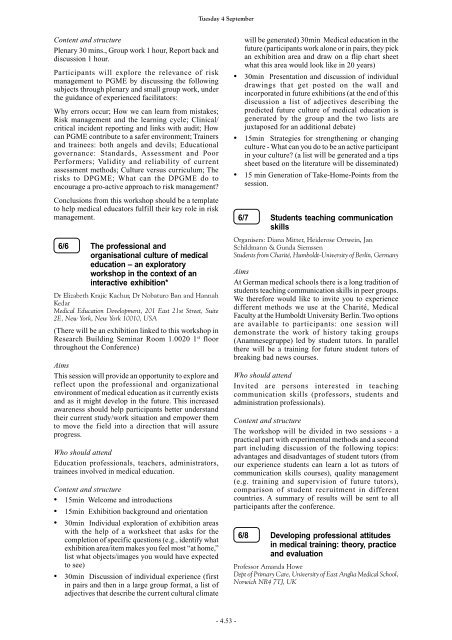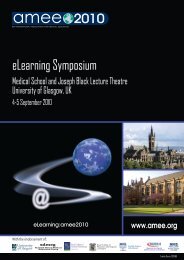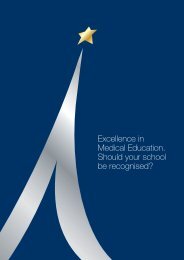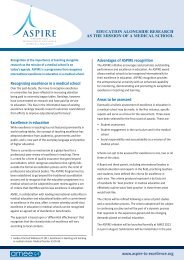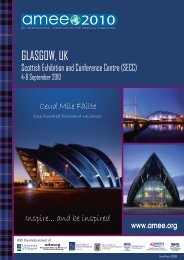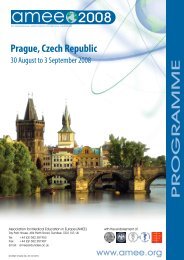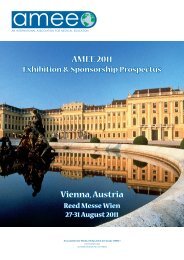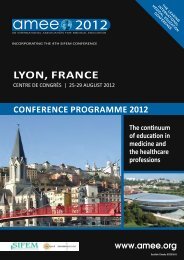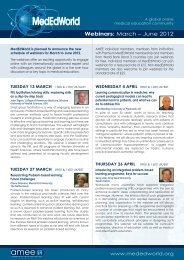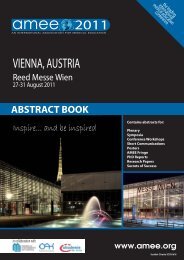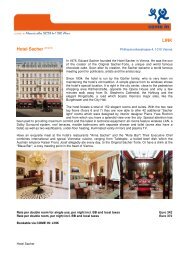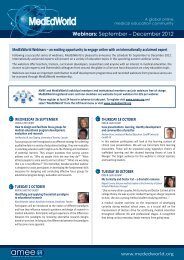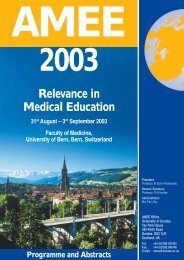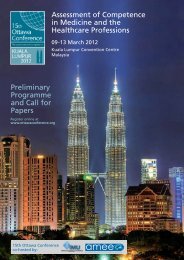AMEE Berlin 2002 Programme
AMEE Berlin 2002 Programme
AMEE Berlin 2002 Programme
You also want an ePaper? Increase the reach of your titles
YUMPU automatically turns print PDFs into web optimized ePapers that Google loves.
Content and structure<br />
Plenary 30 mins., Group work 1 hour, Report back and<br />
discussion 1 hour.<br />
Participants will explore the relevance of risk<br />
management to PGME by discussing the following<br />
subjects through plenary and small group work, under<br />
the guidance of experienced facilitators:<br />
Why errors occur; How we can learn from mistakes;<br />
Risk management and the learning cycle; Clinical/<br />
critical incident reporting and links with audit; How<br />
can PGME contribute to a safer environment; Trainers<br />
and trainees: both angels and devils; Educational<br />
governance: Standards, Assessment and Poor<br />
Performers; Validity and reliability of current<br />
assessment methods; Culture versus curriculum; The<br />
risks to DPGME; What can the DPGME do to<br />
encourage a pro-active approach to risk management?<br />
Conclusions from this workshop should be a template<br />
to help medical educators fulfill their key role in risk<br />
management.<br />
6/6 The professional and<br />
organisational culture of medical<br />
education – an exploratory<br />
workshop in the context of an<br />
interactive exhibition*<br />
Dr Elizabeth Krajic Kachur, Dr Nobaturo Ban and Hannah<br />
Kedar<br />
Medical Education Development, 201 East 21st Street, Suite<br />
2E, New York, New York 10010, USA<br />
(There will be an exhibition linked to this workshop in<br />
Research Building Seminar Room 1.0020 1st floor<br />
throughout the Conference)<br />
Aims<br />
This session will provide an opportunity to explore and<br />
reflect upon the professional and organizational<br />
environment of medical education as it currently exists<br />
and as it might develop in the future. This increased<br />
awareness should help participants better understand<br />
their current study/work situation and empower them<br />
to move the field into a direction that will assure<br />
progress.<br />
Who should attend<br />
Education professionals, teachers, administrators,<br />
trainees involved in medical education.<br />
Content and structure<br />
• 15min Welcome and introductions<br />
• 15min Exhibition background and orientation<br />
• 30min Individual exploration of exhibition areas<br />
with the help of a worksheet that asks for the<br />
completion of specific questions (e.g., identify what<br />
exhibition area/item makes you feel most “at home,”<br />
list what objects/images you would have expected<br />
to see)<br />
• 30min Discussion of individual experience (first<br />
in pairs and then in a large group format, a list of<br />
adjectives that describe the current cultural climate<br />
Tuesday 4 September<br />
- 4.53 -<br />
will be generated) 30min Medical education in the<br />
future (participants work alone or in pairs, they pick<br />
an exhibition area and draw on a flip chart sheet<br />
what this area would look like in 20 years)<br />
• 30min Presentation and discussion of individual<br />
drawings that get posted on the wall and<br />
incorporated in future exhibitions (at the end of this<br />
discussion a list of adjectives describing the<br />
predicted future culture of medical education is<br />
generated by the group and the two lists are<br />
juxtaposed for an additional debate)<br />
• 15min Strategies for strengthening or changing<br />
culture - What can you do to be an active participant<br />
in your culture? (a list will be generated and a tips<br />
sheet based on the literature will be disseminated)<br />
• 15 min Generation of Take-Home-Points from the<br />
session.<br />
6/7 Students teaching communication<br />
skills<br />
Organisers: Diana Mitter, Heiderose Ortwein, Jan<br />
Schildmann & Gunda Siemssen<br />
Students from Charité, Humboldt-University of <strong>Berlin</strong>, Germany<br />
Aims<br />
At German medical schools there is a long tradition of<br />
students teaching communication skills in peer groups.<br />
We therefore would like to invite you to experience<br />
different methods we use at the Charité, Medical<br />
Faculty at the Humboldt University <strong>Berlin</strong>. Two options<br />
are available to participants: one session will<br />
demonstrate the work of history taking groups<br />
(Anamnesegruppe) led by student tutors. In parallel<br />
there will be a training for future student tutors of<br />
breaking bad news courses.<br />
Who should attend<br />
Invited are persons interested in teaching<br />
communication skills (professors, students and<br />
administration professionals).<br />
Content and structure<br />
The workshop will be divided in two sessions - a<br />
practical part with experimental methods and a second<br />
part including discussion of the following topics:<br />
advantages and disadvantages of student tutors (from<br />
our experience students can learn a lot as tutors of<br />
communication skills courses), quality management<br />
(e.g. training and supervision of future tutors),<br />
comparison of student recruitment in different<br />
countries. A summary of results will be sent to all<br />
participants after the conference.<br />
6/8 Developing professional attitudes<br />
in medical training: theory, practice<br />
and evaluation<br />
Professor Amanda Howe<br />
Dept of Primary Care, University of East Anglia Medical School,<br />
Norwich NR4 7TJ, UK


